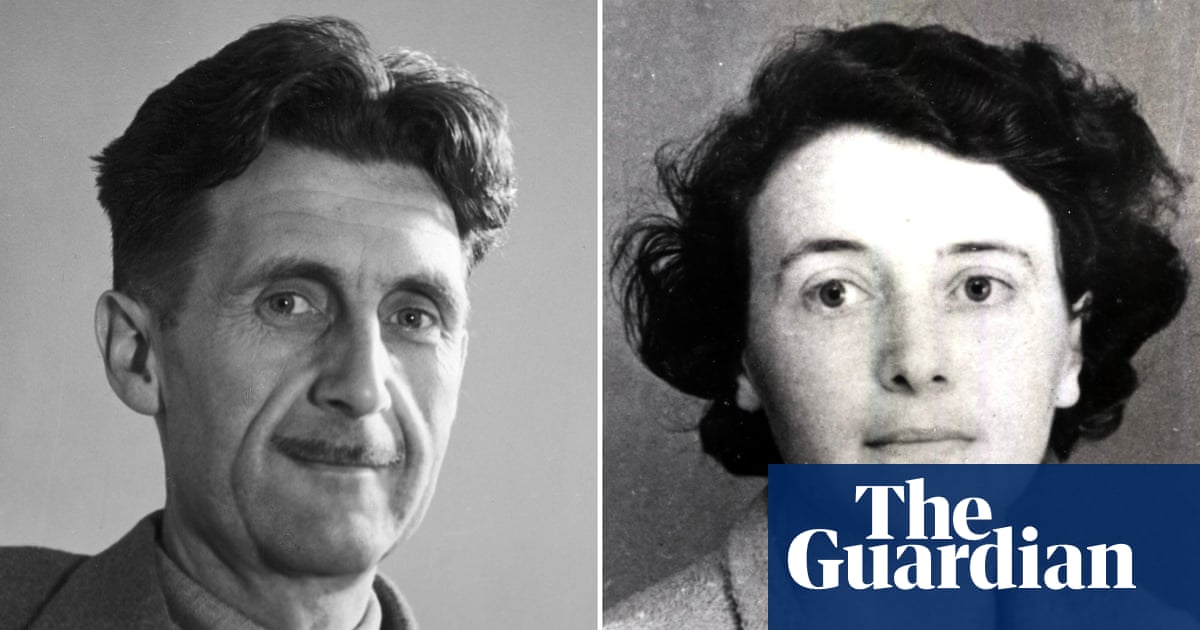As the second world war reached its height, the winter of 1943-4 was one of the coldest of the century. My parents were living in a poorly heated flat in Kilburn, north-west London. My mother was working at the Ministry of Food. She was deeply involved in BBC Radio’s Kitchen Front which tried to help people conjure nutritious meals from their rations. My father became literary editor of Tribune magazine in November 1943. He was only required in the office three days a week, which gave him the time to write Animal Farm.
Every evening, my father would read what he’d written to my mother under heavy blankets in bed. It was the only warm place in the flat. They would discuss the developing story and where it might go next. Lettice Cooper, the novelist and my mother’s Ministry of Food colleague, remembered my mother updating them every morning with the animals’ latest adventures. That my father and mother worked together so closely is no surprise. My father respected my mother’s talents greatly and later told a friend she had helped plan Animal Farm.
Indeed, for some years, my mother had been typing and copy-editing my father’s writing and offering him detailed corrections and revisions. She was probably more deeply engaged with Animal Farm than with his previous work, perhaps even suggesting it should be a “beast fable” rather than the originally planned political polemic. The result of my parents’ teamwork, by the time Animal Farm was finished in February 1944, was one of the most beautifully written books of the century.
On one level, Animal Farm is an ever-relevant satire of the Russian revolution and its betrayal into Stalinist autocracy. That was an evil my father and mother knew first hand. During the Spanish civil war they had witnessed the Stalinists slander, imprison, torture and murder dozens of their friends and comrades who did not slavishly follow the Soviet party line. They even had to flee Spain themselves under threat of Stalinist arrest and execution. Nothing dispels political illusions quicker than being pursued by fanatical murderers. These experiences, and the endless darkness of Stalin’s famines, gulags and purges, convinced my father that Soviet Russia was the very opposite of true socialism. He believed fervently that if democratic socialism was to flourish in the west, then the “myth” that Russia was a socialist state had to be debunked.
But there were profound challenges that had to be overcome before Animal Farm could be published. There was a deep-rooted institutional reluctance to allow any criticism of Soviet Russia while it was a British ally leading the destruction of Nazi Germany. This attitude was compounded by relentless Soviet government lobbying and the comprehensive infiltration of British institutions by Soviet agents. Peter Smollett (AKA Smolka, Soviet agent codename ABO) was head of Soviet relations at the Ministry of Information and the now notorious Cambridge spy Guy Burgess was a BBC producer.
Everywhere, negative stories about Russia were quietly downplayed or suppressed and positive ones megaphoned. In this climate, five major publishing houses (at least one of them advised by Smollett) turned down Animal Farm as an inappropriate attack on a vital wartime ally. Even Faber, following its director TS Eliot’s advice, doubted “that this is the right point of view from which to criticise the political situation at the present time”.
Finally, in July 1944, Fredric Warburg of Secker & Warburg, known for courageously publishing controversial leftwing books, agreed to take it on. Even then, paper shortages and possibly ongoing reluctance to offend Britain’s ally, meant Animal Farm was not published until 17 August 1945. When it finally appeared, my father was surprised at how little fuss there was about his bold satire of Stalinism and dictatorship. But relations with Russia were by then rapidly cooling and, as my father said, people were “fed up with all [this] Russian nonsense”. Animal Farm’s time had come. Since its first publication 80 years ago, it has sold more than 11m copies and never been out of print.
But Animal Farm is more than just a satire of the Russian Revolution. This “fairy story” (as my father called it) is an eternal warning against political leaders who hijack potentially noble movements for their own selfish purposes. My father thought all politicians should be watched hawkishly, confronted truthfully (whatever the price) and kicked out when they put their interests before those of their country.
after newsletter promotion
Animal Farm has had a remarkable life story, playing its part in democratic protests behind the iron curtain and more recently in Myanmar, Zimbabwe and Ukraine. It remains an unforgettable inspiration to all those fighting for freedom. In a world where authoritarianism, nationalism, xenophobia and political lying are all on the rise, we need Animal Farm by our side more than ever now.
